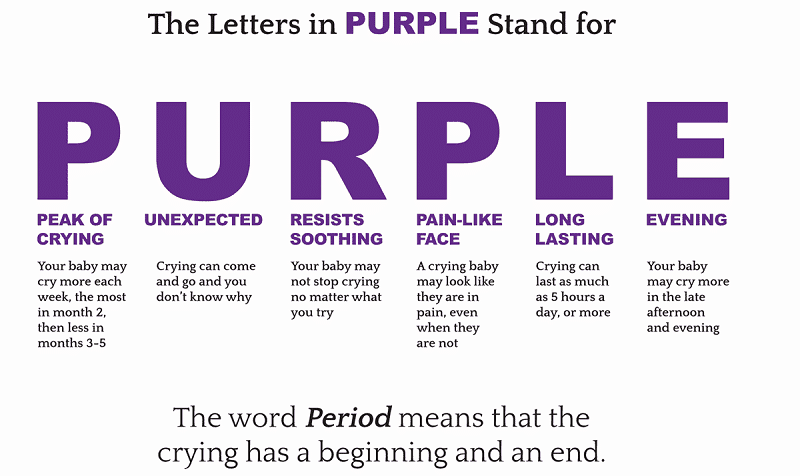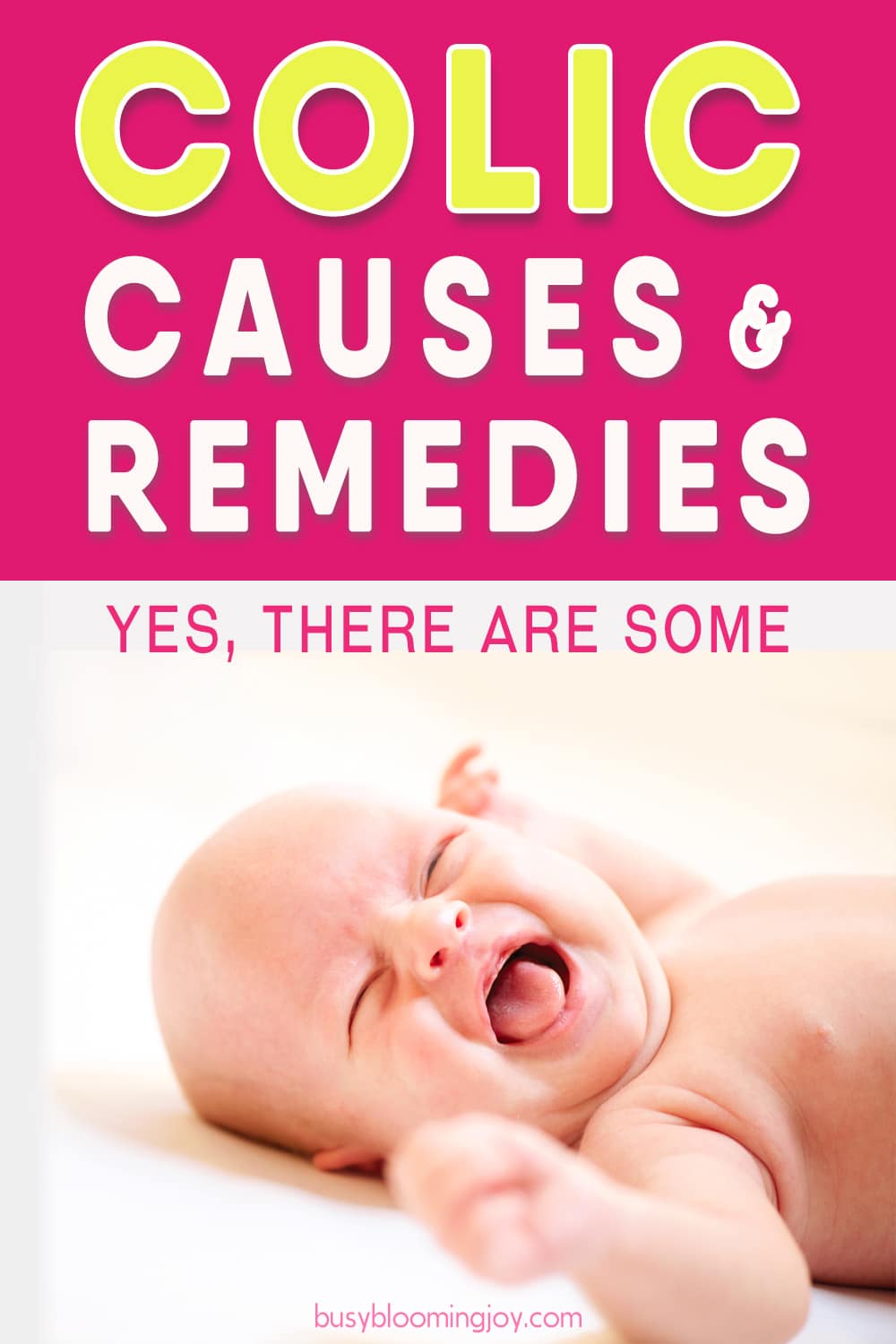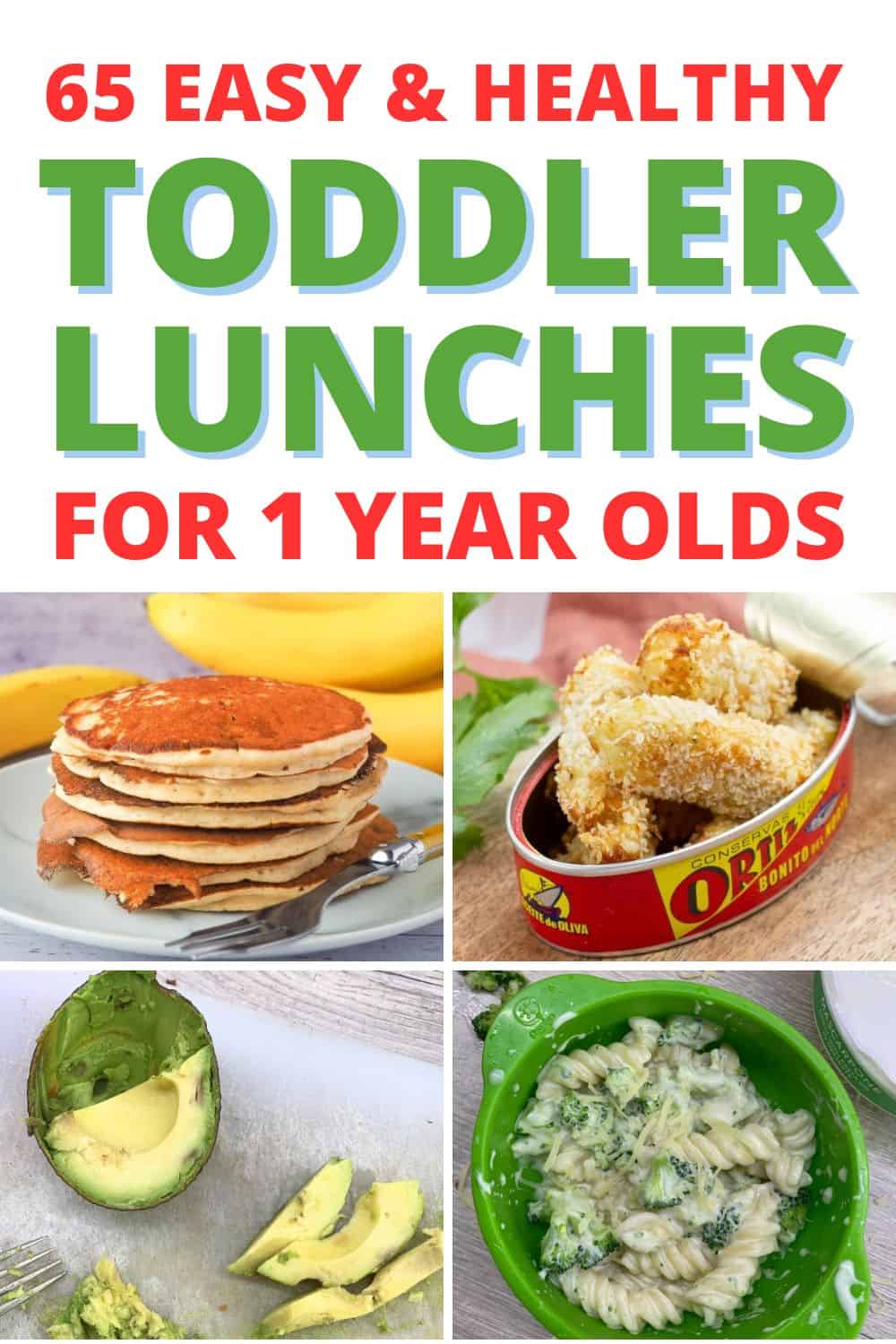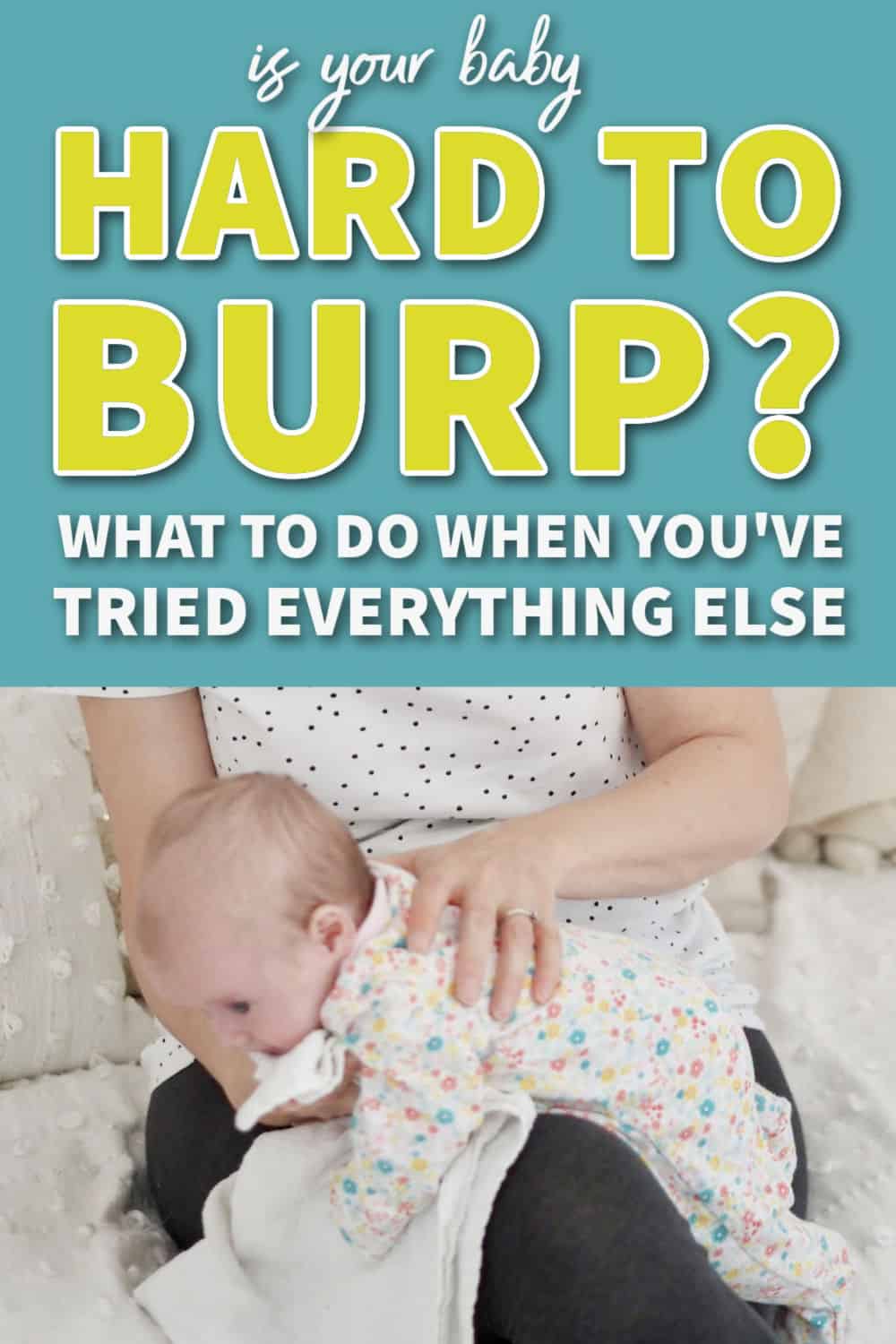Colic. You can’t fail to have heard of it. But what is it and what causes colic?
You may have heard that there’s nothing to be done for a colicky baby.
Is baby suddenly crying inconsolably?
“Oh, that’s colic, don’t worry it’ll pass.”
Common ‘advice’ or supposed reassurance given out to desperate parents. Not much hope in that is there?
If crying is ‘inconsolable’, whatever you try will be in vain, right?
In most cases – wrong. So there’s no misunderstanding: W.R.O.N.G.
There are a whole heap of things you can try if your baby has colic. There are colic remedies that can help. There are colic treatments that should work (backed by science). (Of course, there a lot that probably won’t help too).
Figuring out what is causing colic in your baby can help understand how to fix it. It probably won’t be straightforward, but it’s definitely worth a go.
With a little, or perhaps a lot, of trial and error you should find something to help your colicky baby.
Table of Contents
ToggleColic definition & symptoms
Colic is defined as recurring and long bouts of inconsolable crying, with no obvious cause.
Gas pains and abdominal discomfort were thought to be the root cause, hence the name ‘colic’, which means affecting the colon.
However, several studies in the 1950s observed many babies who cried excessively but had no sign of digestive issues. So gas pain is now not thought to be the cause (though may be a factor).
Hence the ‘Rule of Threes’.
Diagnosing colic with the ‘Rule of Threes’
The current colic definition and diagnosis typically uses the ‘Rule of Threes’:
“A baby that cries for three or more hours per day, at least three times per week, for at least 3 consecutive weeks”. Wessel, et al., 1954.
A further condition is that baby is “otherwise healthy and well-fed”. I.e. Not hungry, ill or visibly in pain.
No reference is made to the cause, since colic is still not fully understand – a combination of factors are thought to be involved.
Unfortunately, that means there isn’t one single answer or solution. Different babies have colic and cry excessively for a different combination of possible reasons.
Probably not the answer you were hoping for, but possibly one you were expecting!
Common characteristics of ‘colic’ crying
In addition to crying episodes being excessive in length (Rule of Threes as above), colicky crying often:
- starts and ends suddenly for no apparent reason
- happens at the same time every day, often in the late afternoon or evening
Some colic FAQs:
Are some babies more likely to suffer from colic than others?
Gender, sex, type of feeding etc, don’t make a difference when it comes to colic. As this study points out, the incidence of colic is:
“Unrelated to family economic class, maternal age, birth order, sex, weight gain, type of feeding, or family history of allergic or gastrointestinal disorder” Jack L. Paradise, MD
When does colic peak?
Colic is thought to affect approximately 10% to 40% of infants worldwide and peaks at around six weeks of age (source).
How long does colic last?
If your baby has colic, you’re more than likely asking ‘when does it end?’ You may be consoled to hear that colicky episodes should have subsided drastically by 3 months and resolved fully when baby reaches six months.
Or this may not offer any consolation at all… 3 months is a loooooonnnng time when you’re in the midst of the newborn phase with a colicky baby. And it’s exhausting (I get it).
What is ‘PURPLE crying’?
You may also have heard of the term PURPLE crying. While a particularly bad crying fit may result in your little one turning a deep shade of crimson, this is NOT what PURPLE crying is about!
PURPLE is an acronym put together by developmental pediatrician Dr. Ronald Barr.
Dr. Barr coined the phrase, “A Period of PURPLE crying’ to reassure parents that crying is a normal part of a newborns development and that there is not necessarily anything ‘wrong’ with a baby who cries a lot.
As you can see from the PURPLE acronym, the excessive nature of the crying patterns of a baby are the same as the modern definition of ‘colic’.
You can read more about PURPLE crying at PURPLEcrying.info.
The problem being, you may feel it’s not worth trying anything to resolve the crying. Hint – is it worth it, keep reading.
Colic & gas pains
Although this modern day definition of colic makes no mention to an obvious or visible cause, excessive crying episodes are very often accompanied by visible discomfort, such as:
- arched back
- clenches fists, flails arms and legs
- curls up and draws knees to chest
- tension or bloating in the abdomen
- grimaces, red faced
- crying, fussiness and general irritability
- high-pitched crying
- spitting-up or vomiting at most feeds
These symptoms often begin during or after a feed and are relieved when the trapped wind and gas passed.
This is a sign of gas pain. (Good news – it’s more than likely that you can do something to help your baby!)
So it seems that such pain is a factor in excessive crying, but cannot explain it fully.
Babies are naturally gassy. And colicky babies are more susceptible to gas pain than other babies. So gas pains are common in babies with colic.
MINIMISING YOUR BABY’S GAS PAINS MAY HELP YOUR COLICKY BABY
This diagram sums up the relationship between excessive ‘colic’ crying and abdominal discomfort.
You can see there’s also a third group of babies – gassy babies that suffer abdominal discomfort and pain, but don’t cry as excessively (don’t fulfill the Rule of Threes).
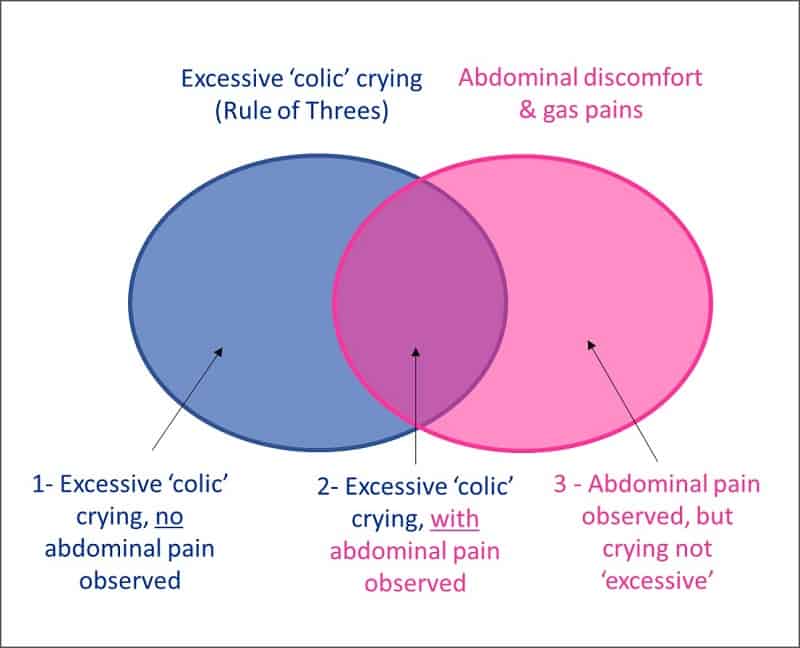
Really, this is all just terminology.
What’s important is helping your baby with any gassiness. If you can figure out the cause, there’s a good chance you can find a remedy and resolve it.
And regardless of how much your baby cries, by reducing or eliminating any gas pains, baby should cry less.
COLIC CAUSES & REMEDIES: behavioral factors making baby gassy
All babies are naturally gassy. Their digestive systems are underdeveloped and they aren’t very good at passing gas. So a little bit of abdominal pain is to be expected.
However, there are a number of factors that can lead to excess gassiness in your baby:
#1 NOT SUCCESSFULLY RELEASING TRAPPED WIND
Babies need a lot more burping than you might think
Colic remedy or treatment
Burp baby, a lot!
BabyCues advises a minimum of 10 burps per feed for babies 1 to 2 weeks, 10 to 20 burps at 2 to 6 weeks and 15 to 25 at 6 to 12 weeks. You can read more about optimum burping here.
Burp baby effectively
Use movements that put gentle pressure on the abdomen. Rub, don’t pat.
Patting your baby’s back can have the adverse effect – breaking down large air bubbles into smaller ones which are harder to pass. Instead, rub baby’s back firmly in a circular movement.
This video here has a good example:
Other good burping techniques
There are many, many ways. Experiment to find a way that works for you and your baby.
Here are some other particularly effective ways which put gentle pressure on baby’s abdomen helping to squeeze out any trapped wind:
- baby bicycles – with baby lying on her back, lift the legs and pedal them
- tummy time – put baby on front and allow her to push up on her hands and explore
- the ‘colic carry’ or ‘tiger in the tree’ – lie baby over your forearm, with her head towards your elbow and your hand supporting her crotch

Look out for ‘wind cues’
There are several signs that baby has trapped wind, which show long before baby becomes uncomfortable to the point of colicky crying.
You may have heard of the ‘windy smile’. Small babies (under 10 weeks) smile when wind is trapped in the upper stomach and throat.
A chewing motion, with the tongue sticking out, is another wind cue.
If you can help baby release this trapped wind, before more accumulates you should be able to avoid the colicky crying and fussiness of extreme gas pains.
BabyCues has identified a total of 6 wind cues, well worth a read.
#2 BABY SWALLOWING EXTRA AIR
A number of factors may cause baby to suck in and swallow more air than necessary.
Colic remedy or treatment
Minimizing gas intake during a feed as follows:
Ensure a good latch if breastfeeding – a poor latch often causes baby to suck in extra air when feeding. If baby does struggle to latch, seek help from a lactation consultant and check for a tongue-tie, which can sometimes be an issue.
Feed before baby becomes frantically hungry – a very hungry baby may gulp down milk, swallowing extra air at the same time.
Avoid over-feeding – this can push undigested milk into the gut prematurely, which is then fermented, rather than digested, producing extra gas.
Watch out for a fast let-down – a fast let-down can cause baby to cough and gulp down milk. If you have a fast let-down, initiate let-down yourself and try and feed in positions where baby has to suck milk uphill.
For formula-feeders:
- allow bubbles to settle before feeding
- hold the bottle at a steep enough angle to ensure the teat is always filled with milk (baby not sucking in air)
- experiment with different bottles – some are specially designed to minimize air intake
- check you’re using the right teat for your baby (too fast a flow or too slow a flow can cause excess gas intake)
For more detail on these common causes of trapped wind and gas in baby and the remedies to fix them, check out this post: Got a gassy baby? 14 Common causes & remedies to fix them for good
#3 OVER-FEEDING
Feeding too often and too much overloads the digestive system, quite literally.
The stomach of a newborn is small – it can only hold so much – and it takes several hours for milk to move from the stomach into the gut. If baby continues to feed when the stomach is full, undigested milk is pushed into the gut too early. It’s then fermented, rather than digested, producing extra gas.
Colic remedy or treatment
Avoid over-feeding & comfort feeding
That makes it sound simple but like most things baby, it isn’t always!
The main issue here is comfort feeding.
Nursing and the sucking sensation is a great source of comfort for babies. And it’s totally natural to want to feed baby in times of distress. Plus, rooting to suck is not only a hunger cue; it’s also about comfort.
So if baby is upset, not only is it our instinct as moms to want to calm them (so feeding is an easy go-to) baby might be rooting and look hungry. In fact, baby may only want comfort.
But comfort feeding can lead to over-feeding, only adding to the problem: more discomfort, pain and upset.
Enter the pacifier.
Baby can suck and calm down, without drinking even more milk.
To avoid feeding too frequently, keep an eye on feed times to allow sufficient time for baby to digest milk. Or try this feed and sleeping schedule, which gradually spaces feeds out (and helps baby develop healthy sleep habits and sleep through the night – wins all around!)
#4 FORE/HINDMILK IMBALANCE
If you’re breastfeeding and have a lot of milk your baby might be getting too much foremilk and not enough hindmilk.
The ‘foremilk’, at the start of the feed, is high in lactose (milk sugar) and low in fats. As the breast empties, the lactose content decreases and fat content increases. So the ‘hindmilk’, at the end of the feed is low in lactose and high in fat.
If you’re producing lots of milk, your baby may end up getting too much foremilk. Either baby’s hunger is satisfied before you reach the hindmilk or you switch sides before reaching it.
If baby gets too much lactose, baby will struggle to digest it all. The excess lactose ferments in the gut. Which means more gas, gas pains and colic.
Reflux Remedy
Ensure breast is empty before switching to the other side
For more details on foremilk, hindmilk and other essential breastfeeding information this post should help: Your Essential Guide To Newborn Breastfeeding: A Must Read To Start It Right
COLIC CAUSES & REMEDIES: underlying gut issues
#5 IMBALANCE OF GUT BACTERIA
There’s evidence that babies are often born with an imbalance of gut bacteria. Babies who cry excessively and diagnosed with colic have been found to have too many ‘bad’ bacteria and too few ‘good’ bacteria, or probiotics.
This leads to excess gas.
The gut health of mothers during pregnancy, as well as natural birth and breastfeeding can all help your baby develop a healthy balance of gut bacteria.
What can really hinder baby’s gut health are antibiotics. I’m sure the heavy dose my daughter had at 3 weeks due to suspected meningitis played a huge part in her colic and reflux. If only I’d known then what I know now.
Colic remedy or treatment
Chances are, that that information is a little too late!
Fear not. After much debate, there is now scientific backing for infant-formulated probiotics. This article, from The American Academy of Pediatrics, concluded that probiotics are effective in reducing the crying times in babies diagnosed with colic.
Look for probiotics which contain L. reuteri DSM 17938, such as this one and this one.
Unfortunately, the jury is still out on the effectiveness of probiotic-fortified formulas.
For more detail on how an imbalance of gut bacteria can cause gassiness, check out the full post on baby gas here: Got a gassy baby? 15 Common causes & remedies to fix them for good
#6 SENSITIVITY TO COW’S MILK OR OTHER FOODS
Cow’s milk protein allergy – or CMPA
Of colic babies fed cow’s milk-based formula, around 10% are thought to be allergic to cow’s milk protein, the allergy the cause of the colicky behavior and gas pains.
The allergy stimulates an immune response, producing more gas.
Other symptoms, involving the skin (such as a red itchy rash) and breathing (wheezing and coughing) normally occur in conjunction with gassiness and abdominal discomfort.
CMPA is much less likely to show in breastfed babies, since exposure to cow’s milk proteins is in significantly lower concentrations (via mom’s breastmilk).
Colic remedy or treatment
Remove cow’s milk protein from baby’s diet
That includes mom’s diet if breastfeeding
Transient Lactose Intolerance
This is a deficiency in lactase, the enzyme that breaks down lactose, the complex sugar found in milk.
Not enough lactase, means that lactose ferments in the gut producing a lot of extra gas.
As baby grows and develops, so do supplies of lactase.
Colic remedy or treatment
Try some Lactase drops
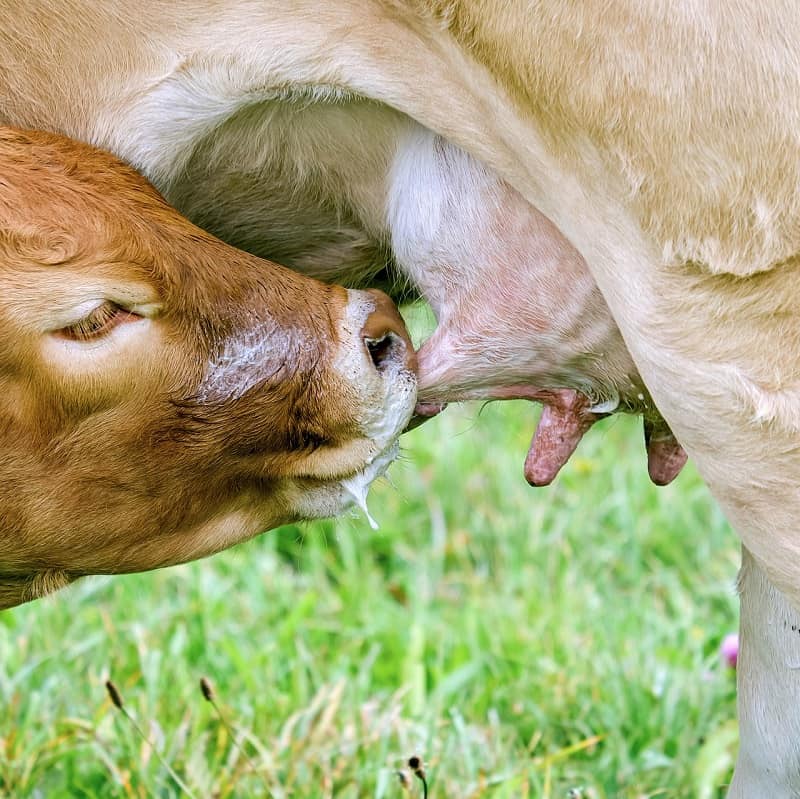
Sensitivities to other foods
Just like cow’s milk proteins, other foods can stimulate an immune response.
Colic remedy or treatment
Mom to remove potential allergenic foods from diet
For more detail on how to manage cow’s milk protein allergy and transient lactase intolerance in your formula-fed or breastfed baby, plus the scoop on which other foods your baby might be sensitive to, check this post: My baby is gassy. Is it a sensitivity to dairy or something else?
#7 SPITTING UP & REFLUX
If baby is ‘spitting up’ a lot of curdled (semi-digested) milk and seems to be crying in pain, reflux might be an issue.
All babies suffer from reflux to some extent. This is when the stomach contents spill up and out of the stomach and into the esophagus. Due to an immature digestive system and other factors, spit up is almost a guarantee!
This is why burps often come with a bit of curdled milk on the side (‘wet’ burps). Burp cloths at the ready…
Gas and wind put pressure on the weak, underdeveloped esophageal sphincter, causing it to open, letting stomach contents out and up.
So more gas = more chance of reflux.
When reflux becomes a problem
Some babies spit up a lot more milk than others AND experience pain in the process.
This can also lead to excessive ‘colic’ crying.
Colic remedy or treatment
Fixing excessive gassiness should minimize reflux
For more detail on reflux, a post is coming shortly!
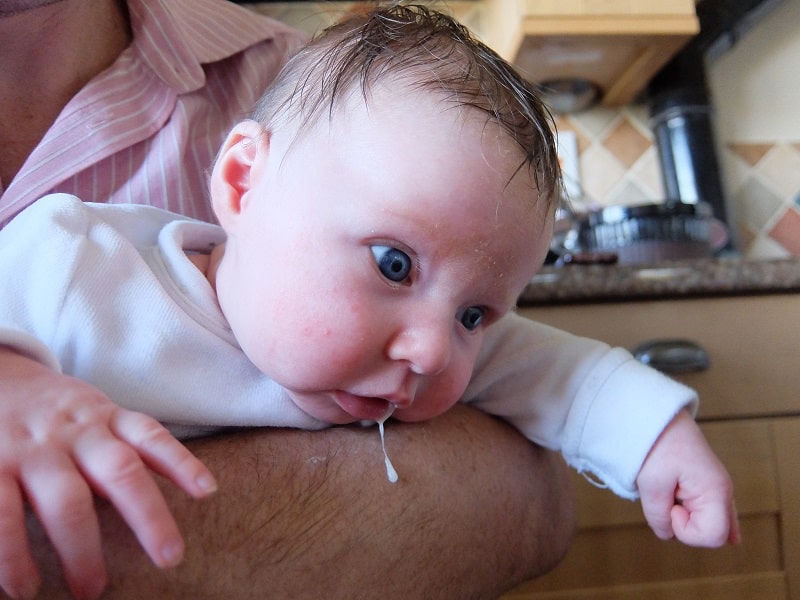
Don’t believe gas pain is the cause of your baby’s colic?
Don’t give up hope just yet.
Don’t give in to the advice to sit tight and wait for this period to pass.
Make sure you’re 100% sure there really isn’t a reason your baby is crying.
Even if you can’t see a reason, that doesn’t mean there isn’t something going on – you might just need to dig a little deeper.
It’s possible your baby IS suffering abdominal pain. It’s just hard to see any specific symptoms because he or she is just crying SO. DAMN. MUCH.
Some of the remedies targeting abdominal pain (as outlined above) have helped colicky babies.
Try them.
Many are lifestyle and/or behavioral changes. Give them a go before you throw in the towel!
You can read about them in more detail here: Got a gassy baby? 14 Common causes & remedies to fix them for good
COLIC CAUSES & REMEDIES: gas pains not a factor
So here we’re talking about the cause of excessive crying when no signs of physical discomfort (eg abdominal discomfort) are also shown.
#8 EASILY STRESSED TEMPERAMENT
Just like adults, some newborns are more easily irritated and reactive to everyday stresses. Given they’ve come from the calm and dark of the womb to the bright city lights of life on earth it’s no surprise they can become stressed easily.
Some babies are more sensitive than others and react with a stress response. Crying.
Differences in the temperament of newborns has been noted as early as a week after birth. This study observed the crying behavior of 1-week old newborns after 30 minutes of activity in hospital, which included being undressed, put down, handled, and finally re-dressed.
The babies most sensitive to this activity (distressed, crying and hard to soothe) were more likely to meet a definition of ‘colic’ at home by the definition of excessive crying (Rule of Threes).
Colic remedy or treatment
Minimize excessive stimulation
This study noted less crying in colicky babies when stimulation was reduced. That means taking baby away from the hustle and bustle of lots of everyday situations.
Does the 15th visitor of the day want a cuddle? Maybe next time! Lots of passing around and strange faces could easily be enough to send a sensitive baby into meltdown… It ain’t worth it!
#9 POOR ABILITY TO REGULATE DISTRESS
Similar to the last one, some babies are less able than others to regulate their own distress response. I.e. once crying, they don’t know how to stop.
This means that colicky babies are unable to be calmed or are less responsive to measures that calm other non-colicky babies.
This has been tested in 2 different circumstances:
- The calming effect of milk sugars is less effective in babies with colic (source)
- Baby carrying can reduce crying and fussing in non-colicky babies (source) but the same is not seen in babies with colic (source)
In the baby carrying study with colic babies, the authors noted that:
“This apparent resistance to increased carrying may indicate an important difference in state regulation and control in infants with colic.”
Colic remedy or treatment
Avoid baby becoming distressed in the first place
So like the last, minimize overstimulation. Otherwise this one largely out of your hands.

#10 THE WITCHING HOUR
Overstimulation and tiredness pretty much sums it up.
Any newborn can become fussy and upset by the stimulation of life in the big outside world. Add in tiredness and by the late afternoon or evening they’re done. If they were able to throw toys out, they would (and if this carries on into toddlerhood, they will!)
This is often termed the ‘Witching Hour.
Attempts to calm baby through a comfort feed, may make the situation worse. Feeding baby when not actually hungry can overload baby’s digestive system, leading to gas pains.
A baby who is highly sensitive, easily stressed and struggles to regulate once distressed, as described above is even more likely to struggle with the witching hour.
If your baby only has colicky episodes during the Witching Hour, this is good news (silver lining) What I mean is that there are a number of things you can do which should drastically improve, if not eliminate the Witching Hour.
Colic remedy or treatment
Avoid baby becoming over-tired & over-stimulated and avoid comfort feeding
Another simple sounding one, right?!
Look out for a witching hour post coming soon.
In the meantime, check you aren’t keeping baby awake too long in the day in this sleep chart post.
Or try this newborn sleep and feeding schedule, which will ensure awake times are not too long and that baby is fed at optimal time intervals.
Is external stress or lack of love and affection a factor in colic?
There is no evidence to suggest that stress in the home and/or anxiety from the mother can cause colic, as stated in this study.
MORE colic remedies & treatments
I’ve outlined the things you can try at home to help your baby with trapped wind. Natural, home remedies if you like.
I’ve also mentioned probiotics and lactase – treatments that may also help colic, by reducing gassiness in your baby.
What about colic drops?
E.g. Gerber Gas Relief Drops, Mylicon, Phazyme and Infacol.
Some mothers swear by them.
So far, there’s no scientific evidence they have any effect. But the active ingredient, simethicone, is not harmful to your baby so there’s no harm in giving it a go.
Can Gripe Water help colic?
Again, no evidence as yet but no harm in trying.
However, different gripe waters have different ingredients. Look for gripe water that is free from alcohol, sugar, sodium bicarbonate, soy, wheat or other potential allergens.
Colic Calm (not an affiliate link) fulfills that list and is even regulated by the FDA.
Checking for other medical causes
Baby may cry for a whole array of different reasons. If it’s not the basic needs of hunger, being too hot, too cold, over-tired, over-stimulated or trapped wind, there may be something else going.
Your baby might be in pain and have other symptoms you can’t see. For example, baby might be suffering from an ear infection or urinary tract infection.
A check-up with your pediatrician should be able to identify other medical causes of excessive crying.
Soothing a colicky baby
If a baby is crying excessively to the point that colic is diagnosed by the Rule of Threes, there will probably be little you can do to soothe baby. Getting to the cause of the colic and trying some of the remedies and treatments above is the way to go.
The so-called ‘colic carry’ may help, as may singing to your baby, dancing while carrying your baby, walking up the stairs backward with your baby, wearing your baby in a wrap, a warm bath, play music or white noise… the list is endless to what you can try to soothe your colicky baby.
But these methods could well be ineffective.
For some babies, the cause of colic is thought to be an inability to regulate distress and calm down (as per #2 above). So while babywearing helped babies that cried a normal amount (source), it did not make a difference to babies diagnosed with colic (source)
In summary
If you starting reading this article wondering how to deal with a colicky baby, hopefully now you have some answers.
Yes, babies cry and colic is common. But don’t give in to this idea that there’s nothing you can do to help your baby.
Chance are, there is and you can.
Your baby will be happier and so will you.
So, it should go without saying, check the list above for potential excess gassiness and take steps to help baby relieve with trapped wind. And burp, burp, burp.
Or check this post here which is dedicated just to gassy babies: Got a gassy baby? 14 Common causes & how to fix them
Give probiotics a try – the science says they can help colicky babies.
Perhaps baby is reacting to something you are eating or to their formula. Investigate further – this should help: My baby is gassy. Is it a sensitivity to dairy or something else?
Maybe you have a super sensitive baby on your hands. Avoid over-tiredness and over-stimulation, particularly towards the end of the day. Try and avoid comfort-feeding which may put extra pressure on the digestive system and add to the problem.
Perhaps there’s an underlying medical issue? Make an appointment with your pediatrician.
Finally, get some support, help, take a break. You never know who might turn out to be your new bestie when it comes to giving you a tear-free 30 minutes (my mother-in-law in my case.)


